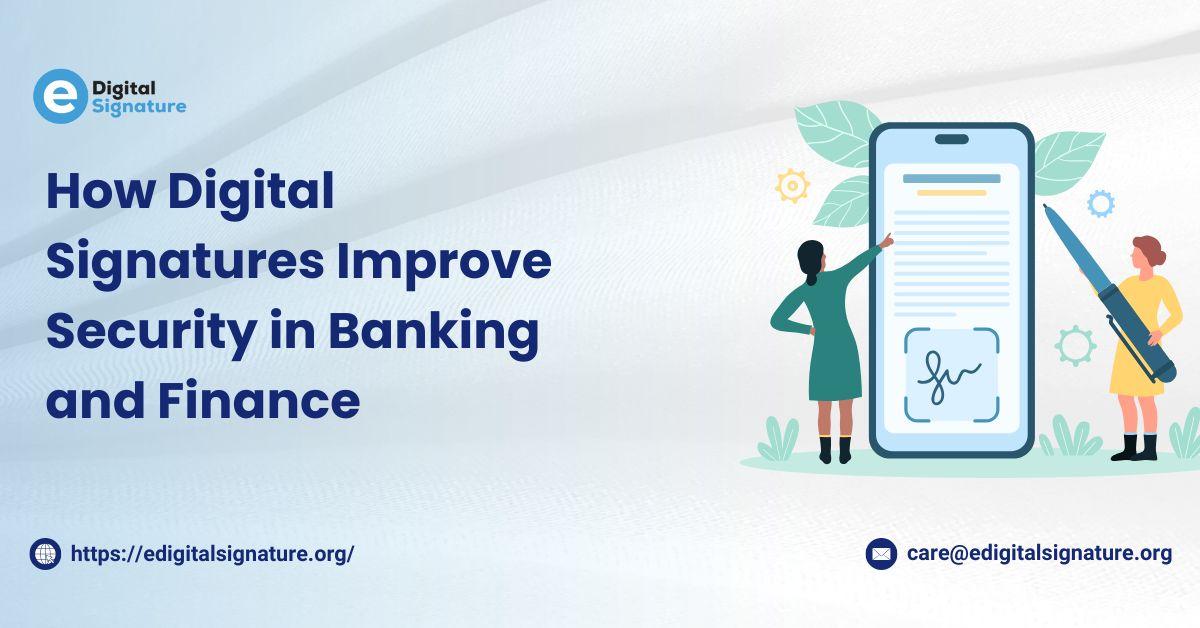How Digital Signatures Improve Security in Banking and Finance

In the digital age, banking and financial transactions have shifted from traditional paperwork to online platforms. With this transition, security concerns such as data breaches, identity theft, and financial fraud have become major challenges. Financial institutions require robust security measures to protect sensitive data, ensure secure transactions, and comply with regulatory standards.
One of the most effective security solutions is digital signature, which provides authentication, data integrity, and non-repudiation in financial transactions. A digital signature is an encrypted electronic signature that verifies the authenticity of documents and transactions. By using cryptographic algorithms, digital signatures ensure that financial transactions remain secure from unauthorized access and fraud.
This article explores how digital signatures improve security in banking and finance, their benefits, regulatory significance, and implementation in modern financial systems.
Understanding Digital Signatures in Banking and Finance
A digital signature is a mathematical algorithm used to validate the authenticity and integrity of a message, software, or digital document. It is based on public-key cryptography (PKC), which involves two keys:
-
Private Key – Used by the sender to create the signature.
-
Public Key – Used by the recipient to verify the signature.
In banking and finance, digital signatures ensure that transactions are authentic, tamper-proof, and legally binding. Financial institutions use digital signatures to secure online banking, loan processing, investment transactions, and regulatory compliance.
How Digital Signatures Improve Security in Banking and Finance
1. Enhancing Authentication and Identity Verification
One of the key security challenges in banking and finance is identity fraud. Digital signatures provide strong authentication by ensuring that only authorized individuals can initiate or approve transactions.
-
Banks issue digitally signed documents to verify account holders' identities.
-
Customers use digital certificates to sign loan agreements, preventing identity theft.
-
Financial institutions verify digital signatures using public key infrastructure (PKI) to authenticate transactions.
2. Ensuring Data Integrity and Preventing Tampering
Financial transactions involve sensitive information that must remain unchanged during transmission. Digital signatures prevent data manipulation and unauthorized alterations.
-
A digital signature is linked to the original document, and any modification invalidates the signature.
-
If an attacker attempts to alter transaction details, the system detects the changes and rejects the transaction.
-
Secure encryption ensures that financial data remains unchanged from sender to receiver.
3. Strengthening Non-Repudiation in Financial Transactions
Non-repudiation means that a signer cannot deny having signed a transaction or document. Digital signatures provide this assurance, preventing disputes and fraudulent claims in banking.
-
When a customer signs a loan agreement digitally, the signature is legally binding.
-
Banks and financial institutions can use digital signatures to prove who authorized a transaction and when it was signed.
-
In case of disputes, digital signatures serve as legal evidence to verify transactions.
4. Securing Online Banking and Fund Transfers
Online banking transactions involve sensitive data, making them a primary target for cybercriminals. Digital signatures secure banking operations by encrypting transactions and preventing unauthorized access.
-
Secure login and authentication: Digital signatures ensure that only authorized users can access online banking portals.
-
Safe fund transfers: Customers digitally sign fund transfer requests, ensuring authenticity and preventing unauthorized transactions.
-
Verification of payment instructions: Banks use digital signatures to authenticate financial instructions and prevent payment fraud.
5. Protecting Electronic Loan Approvals and Agreements
Loan approvals involve multiple documents that require secure signing and verification. Traditional paperwork is vulnerable to fraud and delays. Digital signatures streamline and secure the loan process.
-
Borrowers digitally sign loan agreements, ensuring authenticity and legal compliance.
-
Financial institutions verify digital signatures to confirm customer consent and prevent document tampering.
-
Loan processing time is reduced, and paper-based fraud risks are eliminated.
Digital Signature Process
Step 1: Visit Our Website
-
Go to our website to start the process.
Step 2: Fill in Your Details
-
User Type: Choose if you are an individual or an organization.
-
Certificate Type: Pick if you need it just for signing documents or for both signing and encryption.
-
Validity: Choose how long you want the certificate to last.
-
Personal Info: Enter your name, phone number, email, and address.
-
Agree to Terms: Check the box to agree to the terms.
-
Submit: Click the submit button.
Step 3: Choose Token Option
-
Already Have a Token?: If you have a USB token, choose "No." If you need a new one, choose "Yes."
Step 4: Make Payment
-
Payment: Enter your payment details and choose how you want to pay (net banking, credit card, debit card, or UPI).
Step 5: Complete the Process
-
Review: Make sure all your information is correct.
-
Submit: Click submit and wait for a confirmation email.
Step 6: Get Your Digital Signature
You’ll receive your digital signature on a USB token drive after processing.
Suggested Read – Class 3 Digital Signature Certificate For eTender
Conclusion
Digital signatures have revolutionized security in banking and finance, offering robust protection against fraud, identity theft, and data manipulation. By ensuring authentication, data integrity, and non-repudiation, digital signatures safeguard financial transactions from unauthorized access and cyber threats.
From securing online banking and loan approvals to ensuring compliance and preventing fraud, digital signatures enhance trust, efficiency, and security in the financial sector. As banking continues to move towards digitization and automation, adopting digital signatures is no longer an option—it is a necessity for ensuring safe and seamless financial transactions.
- Art
- Causes
- Crafts
- Dance
- Drinks
- Film
- Fitness
- Food
- Games
- Gardening
- Health
- Home
- Literature
- Music
- Networking
- Other
- Party
- Religion
- Shopping
- Sports
- Theater
- Wellness
- IT, Cloud, Software and Technology


